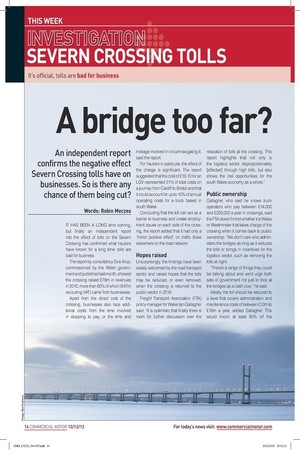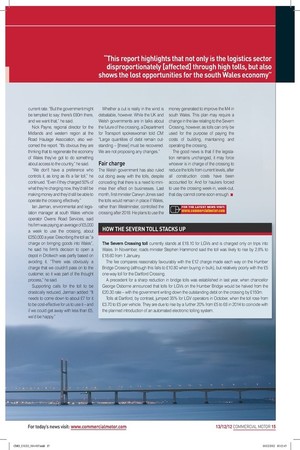A bridge too far?
Page 9

Page 10

If you've noticed an error in this article please click here to report it so we can fix it.
An independent report confirms the negative effect Severn Crossing tolls have on businesses. So is there any chance of them being cut?
Words: Robin Meczes IT HAS BEEN A LONG time coming, but finally an independent report into the effect of tolls on the Severn Crossing has confirmed what hauliers have known for a long time: tolls are bad for business.
The report by consultancy Ove Arup, commissioned by the Welsh government and published last month, showed the crossing raised £76m in revenues in 2010, more than 60% of which (£47m excluding VAT) came from businesses.
Apart from the direct cost of the crossing, businesses also face additional costs from the time involved in stopping to pay, or the time and mileage involved in circumnavigating it, said the report.
For hauliers in particular, the effect of the charge is significant. The report suggested that the cost of £18.10 for an LGV represented 21% of total costs on a journey from Cardiff to Bristol and that it could account for up to 10% of annual operating costs for a truck based in south Wales.
Concluding that the toll can act as a barrier to business and create employment issues on each side of the crossing, the report added that it had only a "minor positive effect" on traffic flows elsewhere on the road network.
Hopes raised Unsurprisingly, the findings have been widely welcomed by the road transport sector and raised hopes that the tolls may be reduced, or even removed, when the crossing is returned to the public sector in 2018.
Freight Transport Association (FTA) policy manager for Wales Ian Gallagher said: "It is optimistic that finally there is room for further discussion over the relaxation of tolls at the crossing. This report highlights that not only is the logistics sector disproportionately [affected] through high tolls, but also shows the lost opportunities for the south Wales economy as a whole."
Public ownership Gallagher, who said he knows truck operators who pay between £14,000 and £200,000 a year in crossings, said the FTA doesn't mind whether it is Wales or Westminster that takes charge of the crossing when it comes back to public ownership. "We don't care who administers the bridges as long as it reduces the tolls or brings in incentives for the logistics sector, such as removing the tolls at night.
"There's a range of things they could be talking about and we'd urge both sets of government not just to look at the bridges as a cash cow," he said.
Ideally, the toll should be reduced to a level that covers administration and maintenance costs of between £12m to £15m a year, added Gallagher. This would knock at least 80% off the current rate. "But the government might be tempted to say: there's £80m there, and we want that," he said.
Nick Payne, regional director for the Midlands and western region at the Road Haulage Association, also welcomed the report. "It's obvious they are thinking that to regenerate the economy of Wales they've got to do something about access to the country," he said.
"We don't have a preference who controls it, as long as it's a fair toll," he continued. "Even if they charged 50% of what they're charging now, they'd still be making money and they'd still be able to operate the crossing effectively."
Ian Jarman, environmental and legislation manager at south Wales vehicle operator Owens Road Services, said his firm was paying an average of £5,000 a week to use the crossing, about £250,000 a year. Describing the toll as "a charge on bringing goods into Wales", he said his firm's decision to open a depot in Droitwich was partly based on avoiding it. "There was obviously a charge that we couldn't pass on to the customer, so it was part of the thought process," he said.
Supporting calls for the toll to be drastically reduced, Jarman added: "It needs to come down to about £7 for it to be cost-effective for us to use it— and if we could get away with less than £5, we'd be happy."
Whether a cut is really in the wind is debatable, however. While the UK and Welsh governments are in talks about the future of the crossing, a Department for Transport spokeswoman told CM: "Large quantities of debt remain outstanding — [these] must be recovered. We are not proposing any changes."
Fair charge The Welsh government has also ruled out doing away with the tolls, despite conceding that there is a need to minimise their effect on businesses. Last month, first minister Carwyn Jones said the tolls would remain in place if Wales, rather than Westminster, controlled the crossing after 2018. He plans to use the money generated to improve the M4 in south Wales. This plan may require a change in the law relating to the Severn Crossing, however, as tolls can only be used for the purpose of paying the costs of building, maintaining and operating the crossing.
The good news is that if the legislation remains unchanged, it may force whoever is in charge of the crossing to reduce the tolls from current levels, after all construction costs have been accounted for. And for hauliers forced to use the crossing week-in, week-out, that day cannot come soon enough. • HOW THE SEVERN TOLL STACKS UP The Severn Crossing toll currently stands at £18.10 for LGVs and is charged only on trips into Wales. In November, roads minister Stephen Hammond said the toll was likely to rise by 2.8% to £18.60 from 1 January.
The fee compares reasonably favourably with the £12 charge made each way on the Humber Bridge Crossing (although this falls to £10.80 when buying in bulk), but relatively poorly with the £5 one-way toll for the Dartford Crossing.
A precedent for a sharp reduction in bridge tolls was established in last year, when chancellor George Osborne announced that tolls for LGVs on the Humber Bridge would be halved from the £20.30 rate — with the government writing down the outstanding debt on the crossing by £150m.
Tolls at Dartford, by contrast, jumped 35% for LGV operators in October, when the toll rose from £3.70 to £5 per vehicle. They are due to rise by a further 20% from £5 to £6 in 2014 to coincide with the planned introduction of an automated electronic tolling system.








































